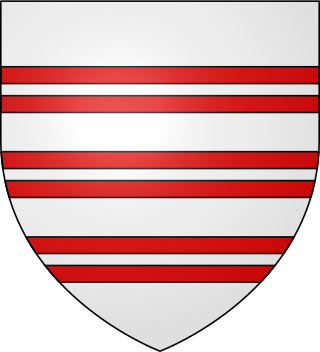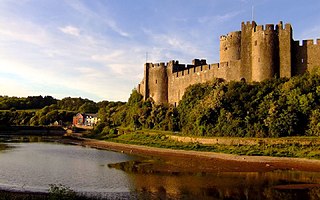Baron Kerry is an ancient title in the Peerage of Ireland named after County Kerry. It was created circa 1223 for Thomas FitzMaurice, Lord OConnello, son of Maurice FitzGerald, Lord of Llanstephan.
Nest ferch Rhys was the daughter of Rhys ap Tewdwr, last King of Deheubarth in Wales, by his wife, Gwladys ferch Rhiwallon ap Cynfyn of Powys. Her family is of the House of Dinefwr. Nest was the wife of Gerald de Windsor, Constable of Pembroke Castle and son of the Constable of Windsor Castle in Berkshire, by whom she was the ancestress of the FitzGerald dynasty.

Knight of Kerry, also called The Green Knight, is one of three Hiberno-Norman hereditary knighthoods, all of which existed in Ireland since feudal times. The other two were The White Knight, being dormant since the 19th century, and the Knight of Glin, dormant since 2011. All three belong to the FitzMaurice/FitzGerald Dynasty commonly known as the Geraldines being created by the Earls of Desmond for their kinsmen.
Earl of Barrymore was a title in the Peerage of Ireland. It was created for David Barry, 6th Viscount Buttevant, in 1627/28. Lord Barrymore held the subsidiary titles of Baron Barry and Viscount Buttevant in the County of Cork in Ireland. After the death of the 8th Earl in 1823, all these titles became extinct.
James de Barry, 4th Viscount Buttevant and 17th Baron Barry (1520–1581) was an Irish magnate. He joined the rebels in the Desmond Rebellion and died in captivity at Dublin Castle.

The de Barry family is a noble family of Cambro-Norman origins which held extensive land holdings in Wales and Ireland. The founder of the de Barra family was a Norman Knight, Odo, who assisted in the Norman Conquest of England during the 11th century. As a reward for his military services, Odo was granted estates in Pembrokeshire and around Barry, Wales, including Barry Island just off the coast.

Edmond George Petty-Fitzmaurice, 1st Baron Fitzmaurice,, styled Lord Edmond FitzMaurice from 1863 to 1906, was a British Liberal politician. He served as Under-Secretary of State for Foreign Affairs from 1883 to 1885 and again from 1905 to 1908, when he entered the cabinet as Chancellor of the Duchy of Lancaster under H. H. Asquith. However, illness forced him to resign the following year.

Gerald de Windsor, aliasGerald FitzWalter, was an Anglo-Norman lord who was the first Castellan of Pembroke Castle in Pembrokeshire. Son of the first Constable of Windsor Castle, and married to a Welsh Princess, he was in charge of the Norman forces in south-west Wales. He was also steward and governor for the Norman magnate Arnulf de Montgomery. His descendants were the FitzGerald dynasty, as well as the FitzMaurice, De Barry, and Keating dynasties of Ireland, who were elevated to the Peerage of Ireland in the 14th century. He was also the ancestor of the prominent Carew family, of Moulsford in Berkshire, the owners of Carew Castle in Pembrokeshire and of Mohuns Ottery in Devon.
The Lord High Treasurer of Ireland was the head of the Exchequer of Ireland, and chief financial officer of the Kingdom of Ireland. The designation High was added in 1695.
Fitzmaurice is a Hiberno-Norman, Cambro-Norman, Anglo-Norman surname. It is patronymic as the prefix Fitz-
derives from the Latin filius, meaning "son of".
The Norse-Gaelic Cotter family of Ireland was associated with County Cork and ancient Cork city. The family was also associated with the Isle of Man and the Hebrides.
The High Sheriff of Clare was a High Sheriff title. Records show that the title was in existence from at least the late 16th century, though it is not used today in the modern Republic of Ireland. The title existed within County Clare in the west of Ireland during the time of the Kingdom of Ireland and then as part of the United Kingdom of Great Britain and Ireland.
Onomastics is an important source of information on the early Celts, as Greco-Roman historiography recorded Celtic names before substantial written information becomes available in any Celtic language.
Cormac na Haoine MacCarthy Reagh, 13th Prince of Carbery (1490–1567) was an Irish chieftain who owned almost half a million acres in south west Ireland.
The High Sheriff of Limerick City was the Sovereign's judicial representative in the city of the City of Limerick. Initially an office for lifetime, assigned by the Sovereign, the High Sheriff became annually appointed from the Provisions of Oxford in 1258. Besides his judicial importance, he had ceremonial and administrative functions and executed High Court Writs. The office was abolished in 1920 on the formation of the Irish Free State.
The High Sheriff of County Cork was the Sovereign's judicial representative in County Cork. Initially an office for lifetime, assigned by the Sovereign, the High Sheriff became an annual appointment following the Provisions of Oxford in 1258. Besides his judicial importance, the sheriff had ceremonial and administrative functions and executed High Court Writs.
Robert de Barry was a Cambro-Norman warrior from Manorbier in Pembrokeshire who participated in the colonisation of the Kingdom of Desmond following the Norman invasion of Ireland.
Philip de Barry, was a Cambro-Norman warrior from Manorbier in Pembrokeshire who participated in the colonisation of Kingdom of Desmond following the Norman invasion of Ireland. He was the founder of the Barry or De Barry family in County Cork, and common ancestor of the barons Barry and earls of Barrymore.
Paddy Conneely was a blind Irish piper and singer.
Walter FitzOther was a feudal baron of Eton in Buckinghamshire and was the first Constable of Windsor Castle in Berkshire, a principal royal residence of King William the Conqueror, and was a tenant-in-chief of that king of 21 manors in the counties of Berkshire, Buckinghamshire, Surrey, Hampshire and Middlesex, as well as holding a further 17 manors as a mesne tenant in the same counties.



